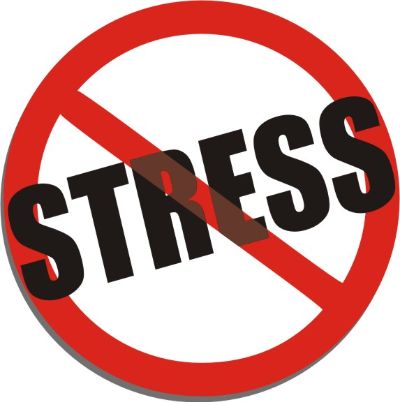
It’s that time of year when stress can be elevated. Stress affects all of us, men, women, and children at various times throughout the year. However, it can be particularly high during the holidays. Isn’t it ironic that a time associated with fun and happiness is often the most stress-inducing time? With all of the shopping hustle and bustle, the pressure to get just the right gift, cook the tastiest meal and host the perfect gathering it makes sense that more of us experience higher levels of stress at this time. And it’s not just adults, some children experience more stress during the holidays too. So let’s talk about stress.
Stress Defined
Dictionary.com defines stress as “a state of mental or emotional strain or tension resulting from adverse or very demanding circumstances.” In psychological terms, stress is a feeling of strain or pressure in response to overwhelming conditions. Simply put it’s the body’s natural way of responding to too much or too little pressure to an unpleasant, uncomfortable or threating situation. Furthermore, the stress response is often more about individual perception than the actual event.
The Stress Cycle
When we think of being stressed we usually think of the negative cycle depicted below.

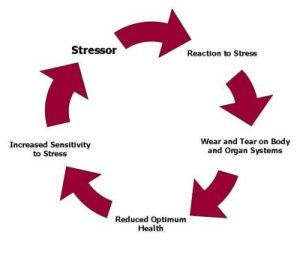
In this cycle how we emotionally perceive stress plays a part in its impact, duration, and severity. However, when stress goes unaddressed it leads to depletion of the body’s resources. Instead of allowing stress to become great, intervene by attempting to naturally reduce symptoms. See the managing stressors section below for suggestions. After a long time with the body in the stress cycle, symptoms become chronic leading to reduced optimal health. The longer we stay in the stress cycle the more susceptible and sensitive we are to stress and its physical and emotional impact. This can keep us easily looping back through the stress cycle.
Brain and Body’s Stress Response
There are a few theories that explain the brain and body response to stress. It should be noted that the stress response is activated in response to both real and perceived stress as the brain, more specifically the amygdala, cannot distinguish the difference. The amygdala which is part of the limbic system is responsible for survival instincts among other functions (such as emotions, memory). The stress response cycle is automatic and hard-wired in the brain. The body’s automatic response system is often greater than the threat or stressor requires. As a result, there is more of a need to manage stress.
The flight or fight response is also known as the hyperarousal or acute stress response is one theory that explains the stress response. First described by Walter Bradford Cannon the flight or fight response is a reaction that occurs when we sense any kind of threat. This response enables us to activate energy needed to cope with the threat and to survive it. So what actually happens to activate the flight or fight response? Bear with me while things get a little science-y and technical but I will make it as concise as I can. I am a proud nerd, therefore, I like to talk about this stuff so here we go… When we go into flight or fight mode the hypothalamus activates the sympathetic nervous system and the adrenal-cortical system. More simply put both the nerves and the bloodstream are activated. When this happens the body is rapidly flooded with epinephrine, norepinephrine and many other hormones that increase the body’s heart rate, blood pressure, and other functions so that the body becomes very alert and ready to take action quickly. All of this occurs so that we will either run (flight) for our lives or fight for our lives. In terms of stress, when the flight or fight system is activated we either fight through it or flee from it. Either way, our bodies are in high alert until the stress subsides.
All that tension and readiness for action has to come down at some point. If it does not the brain and body is in prolonged reaction to stress and stress becomes chronic. To bring the tension down and the brain and body back to homeostasis or stability, that’s where the parasympathetic nervous comes in. It has nearly the exact opposite functions of the sympathetic nervous system. The parasympathetic nervous system controls the body’s function while at rest. So it relaxes the body, inhibits or slows high energy and decreases the heart rate. It takes our bodies down from the tension it needed to be ready to flee or fight back to a state of calm. Actively engaging in activities to more rapidly stimulate the parasympathetic nervous system would help relieve the body’s natural intense reaction to stress.
More recently the term “freeze” has been added to the flight or fight response. This is because instead of deciding to flee or fight we sometimes freeze, like a deer in headlights. When the perceived threat is so intense it triggers a “freeze” response often the brain is overwhelmed by the threat or stressor. In this instance the brain and body still go through the stress response but the call to action that is never initiated, resulting in muscle pain as we do not discharge the tension. We’d have to actively engage in activities to relieve this tension. The freeze response may also occur as a way to mentally protect ourselves from the pain of an inescapable threat. Often, in this case, there’s sometimes no explicit memory after.
Another stress cycle theory is Hans Selye’s General Adaption Syndrome (GAS). The GAS consists of three stages that break down the stress response. These stages are alarm reaction, resistance, and exhaustion. Similar to the flight or fight response, in the alarm reaction stage of the GAS the body perceives a threat. Hormones enter the body that increases the energy level and muscle tension. Also the heart rate and blood pressure to rises which prepares the body for action. In the resistance stage, the body continues rallying resources until energy is depleted or the stressor has ceased. Resources are depleted faster than they can be replaced and as the body continues to use its resources, fatigue, and susceptibility to illness increase. Finally, in the exhaustion phase, the body is completely devoid of its resources. This is when many of the stress warning signs and symptoms are present. This is also when prolonged stress may lead to more serious psychological or medical concerns. Both theories explain short-term effects of stress and account for the implications of persistent stress.
Types of stress
Stress can come in different forms but is typically psychological, emotional, cognitive, physical and behavioral. An individual may experience one or a combination of these. Both too little and too much stress can pose a problem to the brain and body’s proper functioning. However, not all stress is negative. In fact, a healthy level of stress, called positive stress or eustress, a term coined by endocrinologist Hans Selye, is a moderate or typical amount of stress that purports beneficial qualities. These benefits may include increased motivation to complete a task or succeed. Another benefit is improved performance especially for athletes in which stress serves as a challenge rather than anxiety. Furthermore, benefits include short-term immunity boosts and an increase in resiliency when facing stressful situations in the future. Low levels of stress can also boost brain power including temporary improvements in memory and learning. Optimal levels of stress is near the midpoint of positive (eustress) just before stress turns to negative stress (distress) as demonstrated in the image below.
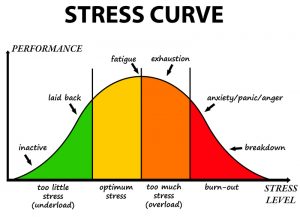
Causes of Stress
Psychology researchers classify causes of stress in four main categories: 1.) crises/disasters – consist of unforeseen, uncontrollable situations that can include personal (i.e, the victim of a crime) and collective (i.e., hurricane) trauma 2.) major life events – includes typical life transitions that are either positive or negative such as going to college, marriage, moving, the birth of a child, the death of a loved one, financial problems, illness, etc. 3.) daily stressors – such as work, driving, traffic, making decisions, dealing with difficult people, etc. and 4.) ambient stress – low grade global stressors that are in the background or rather non-urgent but is always around. It is comprised of pollution, politics, noise, things happening in the media, etc. These are things that may generally affect us but may not always be in our conscious awareness.
Furthermore, Karl Albrecht, author of Stress and the Manager (1979) defined common types of stress. His four types of stress are 1.) time stress – worrying about time or a lack of time when rushing or trying to meet a deadline, 2.) anticipatory stress – stress related to worrying about the future that can be connected to something specific or be unclear and undefined, 3.) situational stress – worry about a specific event or situation that one feels no control over like public embarrassment and 4.) encounter stress – experienced when one worries about interacting with others and may lead to feeling overwhelmed or drained from interacting with or being responsible for many people.
Triggers and experiences of stress are different for everyone. For example, I tend to experience more stress when I have a lot on my plate (daily stressors). Get in touch with things that are likely to increase your stress levels. Identifying causes of stress in your life will make you more aware to help you more effectively manage it. This is especially important since the point where optimal stress can turn into distress is a fine line. That’s why it’s important to be mindful and keep stress in check.
Warning Signs and Symptoms
Stress is essential to survival but too much of it becomes a major contributor to many problems and diseases. Chronic, prolonged stress can harm the brain’s ability to function properly and result in difficulty recalling memories and forming new ones. Stress can also cause neurons to shrink which hinders their abilities to send and receive information throughout the brain. In turn, this hinders messages ability to be properly sent throughout the body. Therefore, stress can reshape our brains and not for the better. When the brain or body is exposed to long-lasting stress the impact can be significant. When left unaddressed or when not properly dealt with stress may lead to a psychological or medical disorder. See the diagram below for many signs and symptoms of stress. Use it to identify symptom you typically experience when you feel stressed. Knowing your warning signs can help you address stress early before it becomes too great.
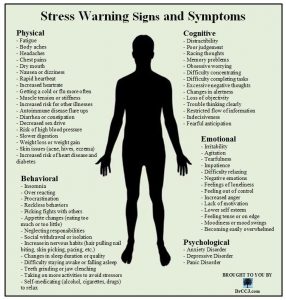
How Do You Respond to Stress?
Do any of these apply to you when you feel stressed?
- I avoid dealing with my stressor(s) or the things I need to do.
- I eat to deal with stress.
- My speech is fast and pressured.
- I drink alcohol, smoke, take drugs or pills to relax.
- I rush around but get little accomplished.
- I work too much or have too much on my plate.
- I sleep too little, too much or both.
- I’m unmotivated and slow down.
If you identified even one of these you may not be handling stress as well as you could. I tend to feel stress physically in my neck and shoulders and I’m prone to craving junk food. Sometimes I may also experience difficulty sleeping well. It is important to know how you react to stressors. In addition to knowing how you respond to stress identify where you physically feel stress. Knowing causes, identifying your stress response and knowing where and how stress shows up will help to better combat it.
Managing Stressors
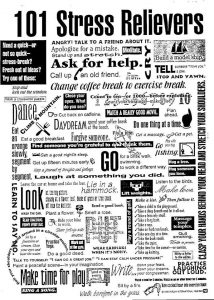 Try mastering the four As of coping with stress. These four strategies include: Avoid, Alter, Accept and Adapt. Believe it or not, some stress CAN be avoided by controlling your surroundings or environment, avoiding annoying people, saying no and simplifying your to-do list. You can alter, or change stress by openly expressing feelings rather than keeping them in, creating a balanced schedule, asking others to change their behaviors as you work to change yours, managing your time, setting limits and establishing boundaries. However, if you cannot change the stress, try accepting it or adapting to it. When there is little to no chance of anything other than accepting something as it is, try talking to someone (a friend, family member, a therapist or your pastor) to express what you are going through. Also, learn to forgive, engage in positive self-talk, learn from the situation, look for the positive in the situation and recognize that the thing is beyond your control. Adapting to stress involves changing your standards or expectations and improving your thoughts related to how you can cope with the stress. Adapting can involve a number of different techniques such as reframing the problem, looking at the big picture, practicing thought-stopping (i.e., stopping pessimistic thoughts) and creating a list of things that bring you joy.
Try mastering the four As of coping with stress. These four strategies include: Avoid, Alter, Accept and Adapt. Believe it or not, some stress CAN be avoided by controlling your surroundings or environment, avoiding annoying people, saying no and simplifying your to-do list. You can alter, or change stress by openly expressing feelings rather than keeping them in, creating a balanced schedule, asking others to change their behaviors as you work to change yours, managing your time, setting limits and establishing boundaries. However, if you cannot change the stress, try accepting it or adapting to it. When there is little to no chance of anything other than accepting something as it is, try talking to someone (a friend, family member, a therapist or your pastor) to express what you are going through. Also, learn to forgive, engage in positive self-talk, learn from the situation, look for the positive in the situation and recognize that the thing is beyond your control. Adapting to stress involves changing your standards or expectations and improving your thoughts related to how you can cope with the stress. Adapting can involve a number of different techniques such as reframing the problem, looking at the big picture, practicing thought-stopping (i.e., stopping pessimistic thoughts) and creating a list of things that bring you joy.
Thankfully stress can be managed in a number of ways. If one does not work for you try another until you find techniques that are helpful. Personally, I like to cook, pray and or reading scripture, do deep breathing or meditate, listen to gospel music or watch a favorite show. While not exhaustive, here are some additional suggestions, other than those listed in the above paragraph, to help manage stress:
- Identify stress triggers
- Practice gratitude
- Pray and/or read scripture
- Meditate
- Exercise
- Walk, run or ride a bike
- Do yoga, tai chi or aerobics
- Practice deep breathing
- Engage in a favorite activity
- Keep a positive mindset
- Use humor/laughter
- Play a board, online or video game
- Reach out to your support system
- Help combat stress in the brain with DHA or Omega-3 supplements
- Engage with others
- Manage your time
- Use positive visualization
- Listen to your favorite tunes
- Do progressive muscle relaxation
- Paint, draw, sculpt or even color
- Write or journal
- Engage in relaxation: a massage, facial, manicure or take a long bath etc.
- Get organized
- Swim, play a sport or dance
- Volunteer to help someone or a worthy cause
- Look at something appealing: art, nature or get fresh flowers
- Watch a comedy, a movie or your favorite TV show
- Work in the garden or cook
- Set smaller, realistic, more attainable goals
- Make a decision (versus indecisiveness)
- Take valerian root or vitamin B-complex
- Eliminate or reduce caffeine
- Do not over-commit yourself
- Ignite your senses: light a candle or put on a diffuser (try lavender, frankincense or bergamot)
- Read a good book or indulge in a magazine
- Resist the urge to self-medicate
- Reduce alcohol intake
- Reduce sugar intake
- Practice self-care
- Rest and get adequate sleep
- Eat well: have some blueberries, avocado, cashews, walnuts, pistachios, oats and popcorn
- Drink a cup of tea, green or chamomile
- Take a trip or opt for a staycation
- Say no to taking on additional obligations
- Engage in a mindful activity
- Accept what cannot be changed
- Use your stress experience to learn and grow
This information has been provided for educational purposes only and is not intended for diagnosis or treatment. If stress becomes chronic, prolonged or becomes too difficult to manage on your own consider engaging in behavioral, talk or neuro therapy and/or consulting with a psychiatrist to discuss how medication may aid in managing your symptoms. Also keep in mind that symptoms of stress can also be due to or exacerbate other problems, both medical and psychological. If you are experiencing any stress symptoms it is highly recommended that you consult a medical or mental health professional for a full evaluation. Be sure to consult with your primary care doctor before making any changes to your diet, taking any supplements or medications to manage stress as well as to determine which physical activities are safe for you to engage in to help manage your stress. Follow safety guidelines when using herbs (i.e., tea) and essential oils. Experiencing stress is inevitable. Takes time to identify common stressors and your reaction to it as well as take steps to actively manage stress before it becomes a major concern.
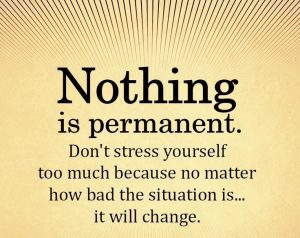
Healthy Brain. Healthy Body. Happy Life.
Dr. J!






Great great article so true take care of yourself I enjoy an hour-long massage with hot stones once a month as well as chiropractic Care
That’s a great way to take care of yourself Candice.
Hey There. I found your blog using msn. This is a very well written article.
I will make sure to bookmark it and return to read
more of your helpful information. Thank you for the post.
I will definitely return.
Hi there! This article couldn’t be written much better!
Looking through this post reminds me of my previous roommate!
He constantly kept preaching about this. I am going
to send this post to him. Pretty sure he will have a great read.
Many thanks for sharing!
What’s up mates, pleasant piece of writing and nice arguments commented here, I am in fact enjoying these.
Woah! I’m really digging the template/theme of this site.
It’s simple, yet effective. A lot of times it’s very difficult to get that
“perfect balance” between superb usability and appearance.
I must say you’ve done a amazing job with this. In addition, the blog loads very
fast for me on Safari. Excellent Blog!
Keep on writing, great job!
Thank you.
Wow, amazing blog layout! How long have you been blogging for?
you make blogging look easy. The overall look of your web
site is excellent, let alone the content!
Thank you.
Excellent website. Lots of useful info here. I’m sending it to several pals ans
also sharing in delicious. And obviously, thank you in your sweat!
Thank you for stopping by and sharing the information with your friends. Much appreciated 🙂
I’ll right away clutch your rss feed as I can not find your e-mail subscription hyperlink or newsletter service. Do you’ve any? Please permit me understand so that I may subscribe.
Thanks. Does your site have a contact page? I’m having trouble locating it but,
I’d like to shoot you an email. Either way, great website and I look forward to seeing it grow over time.
Thank you. I do have a contact page it is easy yo find on the menu bar. I look forward to hearing from you. Have a great day.
This is an excellent article on how to recognize ans manage stress. Stress can often get in the way of everything if you allow it. So being able to use this article as a reference is exactly what the doctor ordered. Thank you Dr. J now I am going to go out and apply these methods.
Thank you for checking this blog out Clinetta. I appreciate your positive feedback about the information. You are correct! Stress can certainly get in the way of everything if we allow it and it does not deserve that much power in our lives so we have to actively prevent and manage it. I am glad the information was helpful. If you try any of the tips do let us know which work best for you. Have a happy, healthful holiday season.